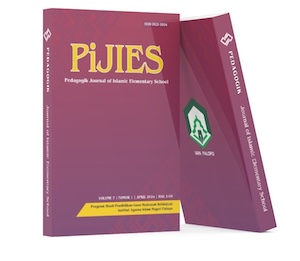The Effectiveness of the Role Playing Method on Students' Speaking Skills in Indonesian Language Learning for Elementary Students
DOI:
https://doi.org/10.24256/pijies.v6i2.4192Keywords:
speaking skills, role playing methodsAbstract
This study aims to improve students' speaking skills through learning with the role play method in grade IV elementary school students in the 2022/2023 school year. Previously, students were still passive in participating in the learning process, especially in Indonesian language subjects because in learning activities the teacher had not used a learning model. Teachers often use the lecture method followed by doing questions in the theme book so that students get bored quickly. The subjects of this study were fourth grade students as an experimental class totaling 28 students. This research is a quantitative research with the form of one pretest-posttest design. This design has a pretest, before treatment and posttest after treatment.
References
Arikunto, S. (2013). Prosedur Penelitian Suatu Pendekatan Praktik. Rineka Cipta.
Ernani, & Syarifuddin, A. (2016). Mata Pelajaran Bahasa Indonesia Kelas V di Madrasah Ibtidaiyah Wathoniyah. JIP: Jurnal Ilmiah PGMI, 2(1), 31–32.
Julian Indah Puspitaningrum, Mei Fita Asri Untari, I. L. (2019). Keefektifan Model Bermain Peran (Role Playing) Terhadap Kemampuan Berbicara Siswa Pada Pembelajaran Bahasa Indonesia. Journal for Lesson and Learning Studies, 2(1), 296–304.
Maria Ulfah, S., & Budiman, M. A. (2019). Keefektifan Model Pembelajaran Role Playing Terhadap Kemampuan Berbicara. Journal for Lesson and Learning Studies, 2(1). https://doi.org/10.23887/jlls.v2i1.17324
Sani, R. A. (2013). Inovasi Pembelajaran. Bumi Aksara.
Sari, R. K. (2020). Efektivitas Penggunaan Model Pembelajaran Role Playing Terhadap Ketrampilan Berbicara Pada Bahasa Indonesia Tingkat Sd. Jurnal Pendidikan Dan Konseling (JPDK), 2(1), 61–67. https://doi.org/10.31004/jpdk.v1i2.582
Sugiyono. (2013). Metode Penelitian Kuantitatif KualitatifF Dan R&D. Alfabeta CV.
Downloads
Published
How to Cite
Issue
Section
Citation Check
License
Copyright notice:
Authors retain copyright and grant the journal right of first publication with the work simultaneously licensed under an Attribution-ShareAlike 4.0 International (CC BY-SA 4.0) (https://creativecommons.org/licenses/by-sa/4.0/) that allows others to share the work with an acknowledgement of the work's authorship and initial publication in this journal.
Authors are able to enter into separate, additional contractual arrangements for the non-exclusive distribution of the journal's published version of the work (e.g., post it to an institutional repository or publish it in a book), with an acknowledgement of its initial publication in this journal.
Authors are permitted and encouraged to post their work online (e.g., in institutional repositories or on their website) prior to and during the submission process, as it can lead to productive exchanges, as well as earlier and greater citation of published work (See the Effect of Open Access)







 This is an open access article under the
This is an open access article under the 